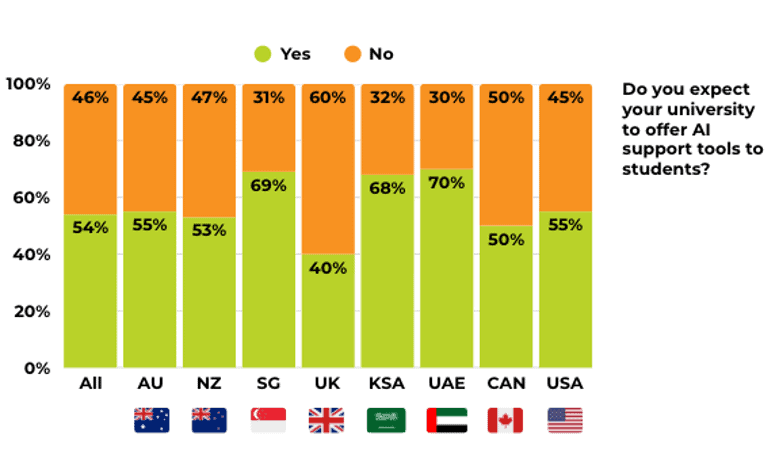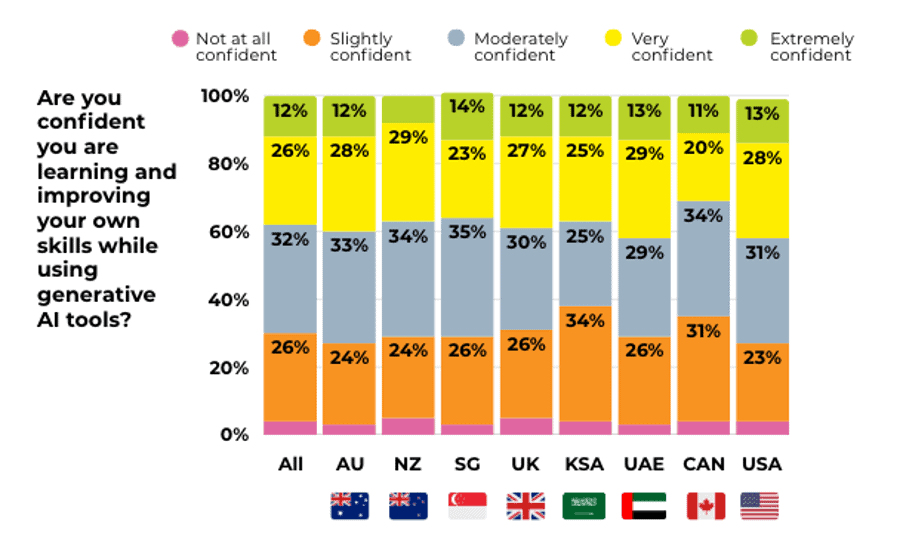Student Wellbeing in the AI Era: Stress, Confidence, and Connection – A Global Snapshot
This HEPI blog was authored by Isabelle Bristow, Managing Director UK and Europe at Studiosity.
Studiosity’s ninth annual Student Wellbeing Survey, conducted by YouGov in November 2024, gathered insights from university students on their experiences and concerns, and made recommendations to senior leaders. This global research included panels from Australia, Canada, New Zealand, Saudi Arabia, Singapore, the UAE, the UK and the US (see below for the country sample size breakdown).
The report highlights key learning on AI’s rapid integration into higher education and its impact on student wellbeing. The following are the key takeaways, specifically examining country-specific differences in student experiences with AI, alongside broader issues of stress, connection, belonging, and employability.
AI Adoption and Its Impact
AI is now a pervasive tool in higher education, with a significant 79% of all students reporting using AI tools for their studies. While usage is high overall, the proportion of students saying they use AI ‘regularly’ to help with assignments shows interesting variations by country:
- UK: 17%
- USA: 27%
- Singapore: 31%
- UAE: 38%
This greater scepticism towards AI among UK students also shows up elsewhere, with students in the UK least likely among the eight countries to expect their university to offer AI tools.

However, the widespread adoption of AI tools is linked to considerable student stress. The survey found that 68% of students report experiencing personal stress as a result of using AI tools for their coursework. From free text comments, this might be for a number of reasons, including the fear they might be unintentionally breaking the rules; there are also concerns that universities are not moving fast enough to provide AI tools, leaving students to work out for themselves how best to use AI tools. This highlights that navigating the effective and appropriate use of AI is a significant challenge that requires support.
Furthermore, the way AI is currently being used appears to be affecting students’ confidence in their own learning. Some 61% feel only ‘moderately’ or less confident that they are genuinely learning and improving their own skills when using generative AI.

Perhaps as a result of this uncertainty, students often seek ‘confidence’ when using university-provided AI support, desiring guided tools that help them check their understanding and validate their genuine learning progress. This motivation was particularly strong in countries like:
- New Zealand: 31%
- Australia: 25%
- UK: 25%
This suggests a tension between unstructured AI use (linked to lower learning confidence) and the student desire for confidence-building support (which AI, when properly designed for learning, offers).
Perceptions of how well universities are adapting to AI also vary globally, with 56% of students overall feeling their institutions are adapting quickly enough. However, scepticism is notably higher in certain regions:
- UK: 53% feel institutions are not adapting fast enough
- Canada: 52% feel institutions are not adapting fast enough
Conversely, students in other countries feel their university is adapting fast enough to include AI support tools for study:
- UAE: 72%
- Singapore: 66%
- Saudi Arabia: 65%
- USA: 58%
Study Stress: Beyond AI
While AI contributes to stress, study stress is a broader, multi-faceted challenge for student wellbeing, with frequency and causes differing significantly across countries. Students reported experiencing stress most commonly on a weekly basis (29% overall), with more students than average in Australia and New Zealand (both 33%) experiencing stress on a weekly basis. However, the intensity increases elsewhere:
- Saudi Arabia: 27% felt stressed daily
- Canada: 24% felt stressed daily, and a notable 17% felt stressed constantly
- USA: 16% felt stressed constantly
The top reasons for general study stress also vary, pointing to the diverse pressures students face:
- ‘Fear of failing’: significantly higher in the UK (61%) compared with the global average of 52%
- ‘Not having enough time to balance other life commitments’: significantly higher in the UK (52%) and Australia (48%)
- ‘Difficult course content’: Singapore (38%)
- ‘Paying for degree’: Canada (35%) and the USA (31%)
- ‘Sticking to the rules around integrity and plagiarism’: over-indexed in the UAE (23%) and Saudi Arabia (22%)
Belonging and Connection
A sense of belonging is a crucial component of student wellbeing, and the survey revealed variations across countries. Students in Australia (62%) and the UK (65%) reported lower overall belonging levels compared to the global average. What contributes to belonging also differs:
- ‘Confidence to reach out to teachers’: significantly higher factor in the UK (64%)
- ‘A flexible schedule to help balance work and study’: dominated as a top reason in Australia (63%) and Singapore (62%)
- ‘Ease of connecting with a student mentor’: featured prominently in Saudi Arabia (47%), UAE (48%), and USA (43%)
- ‘Access to mental health support’: over-indexed as a key reason for belonging in Saudi Arabia (47%) and Canada (44%)
The study also explored direct connections, addressing concerns that AI might reduce human interaction. Students were largely neutral or unsure if generative AI impacted their interactions with peers and teachers (including 63% of students in the UK and 55% in New Zealand). In contrast, students in Saudi Arabia (64%) and the UAE (61%) were most likely to report more interaction due to AI use, followed by Singapore (42%) and the USA (41%).
Beyond AI’s influence on connection, the survey found that four in ten students (42%) were not provided a mentor in their first year, although over half (55%) would have liked one. Difficulty asking questions of other students was also mentioned by one in ten (13%) students overall. This difficulty was reported more by:
- Female students: 14% vs 10% for males
- Older cohorts (50+ year olds): 18% vs 13% for 18-25 year olds
- Students in the UK (17%), Australia (17%), and New Zealand (16%) compared to other regions.
Employability Confidence
Employability is another key area impacting student confidence and overall wellbeing as they look towards the future. The survey found that 59% of students are confident in securing a job within six months of graduation, an increase from 55% in 2024, though concerns remain higher in Canada and the UK. Overall, 74% agree their degree is developing necessary future job skills, although Canadian students were less confident here (68%). Specific concerns about the relevance of a job within six months were more pronounced among:
- UK students: 20% disagree they will get a related job
- Canadian students: 14% disagree
Conclusion
The YouGov-Studiosity survey provides valuable data highlighting the complex reality of student wellbeing in the current higher education landscape. Rapid AI adoption brings new sources of stress and impacts confidence in learning, adding to existing pressures from general study demands, financial concerns, belonging, connection, and employability anxieties. These challenges, and what supports students most effectively, vary significantly by country. Universities must respond to this complex picture by developing tailored support frameworks that guide students in navigating AI effectively, while also bolstering their sense of belonging, facilitating connections, addressing mental health needs, and supporting their confidence in future careers, in ways responsive to diverse national contexts.
By country totals: Australia n= 1,234: Canada n= 1,042: New Zealand n= 528: Saudi Arabia n= 511: Singapore n= 1,027: United Arab Emirates n=554: United Kingdom n= 2,328: United States n= 3,000
You can download further Global Student Wellbeing reports by country here.
Studiosity is a HEPI Partner. Studiosity is AI-for-Learning, not corrections – to scale student success, empower educators, and improve retention with a proven 4.4x ROI, while ensuring integrity and reducing institutional risk.







Comments
Ron Barnett says:
Yet another HEPI article on AI that largely ducks the criticisms that have been directed at AI – outsourcing of thinking, depletion of humanity’s cognitive resources, control by corporations not having educational interests, opaqueness of the platforms (and so unavailable for serious interrogation), loss of authenticity, avoidance of the cognitive challenges (and discomforts) that a genuine higher education can bring, hallucinations, bias in favour of white, male, and global north stances, loss of meaning (as in ‘I mean what I say’ AND ‘I say what I mean’), prevarication both in universities and academic publishing over the use of AI (not daring to rock boats), lost of critical thinking, reduction of ‘mind’ to ‘brain’, the belief that digital processes are thinking processes and that human minds are just computers and therefore easily replaceable by digital processes, the intrusion into and the destablisation of the pedagogical relationship and so on and so on.
I will start taking seriously articles on AI where they acknowledge a fair proportion of these fundamental societal and educational challenges that AI is posing – all of which have been advanced in the literature over the past 20+ years.
Ron Barnett
UCL
Reply
Muhammad Sohail says:
AI is often discussed as a tool, yet its growing role in education challenges us to reflect on authenticity, critical thinking and the cultivation of the mind. Questions about cognitive outsourcing, biases, the reduction of mind to computation, and the destabilization of pedagogical relationships are not minor; they are foundational.
Perhaps the most important task for educators, scholars, and society is to confront these tensions openly rather than sidestep them. Engaging honestly with both the promise and the pitfalls of AI can transform it from a disruptive novelty into a lens through which we interrogate what higher education should truly aim to nurture: human judgment, moral reasoning, and the courage to wrestle with discomfort and uncertainty. Only then can we hope to integrate AI in ways that augment, rather than erode, our shared intellectual and ethical commitments.
Reply
Add comment